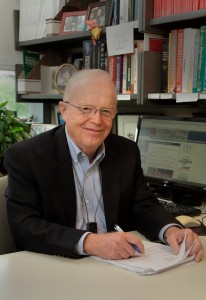 In this season of giving thanks, we’ll sit down for a day and express appreciation for all we have and for whom we love. Our sentiments of gratitude will be sincere. We are grateful, maybe even content, and we mean it. Then we’ll see the Black Friday bargain flyers in the Thanksgiving Day newspaper, weighing about five pounds more than average, and the contented feeling flees. “What is on sale? How much can we save? How much can we get?”
In this season of giving thanks, we’ll sit down for a day and express appreciation for all we have and for whom we love. Our sentiments of gratitude will be sincere. We are grateful, maybe even content, and we mean it. Then we’ll see the Black Friday bargain flyers in the Thanksgiving Day newspaper, weighing about five pounds more than average, and the contented feeling flees. “What is on sale? How much can we save? How much can we get?”
The real question we should ask though, posits Dr. David Myers, professor of psychology, is this: how much is enough? It’s a hard question to ask and even harder to answer in this age and country of plenty, yet everything he knows from his research and his personal life tells him the best things in life aren’t things.
Dr. Myers has been called Hope’s happiness guru, not only for his writings on the topic, but also for his ever optimistic, ever smiling, ever encouraging disposition. You would be hard-pressed to find someone happier.

And just this week, he is also Hope’s newly elected fellow of the prestigious American Association for the Advancement of Science (AAAS). Dr. Myers was chosen for this honor for distinguished contributions to the field of social psychology and communication of psychological science to students and the public. His highly successful textbooks and nine other books on topics ranging from intuition to hearing loss to happiness have educated millions in classrooms and for personal inquiry. His hundreds of presentations and articles on his expertise evidences a man who finds much of his happiness in what he does.
“Surprised and appreciative,” Dr. Myers says of his reaction to the revelation of this newest honor.
“And if there is one virtue I believe I am capable of, it is gratitude. I’m overwhelmed by gratitude for so many wonderful people whom I love and admire because it is these brilliant people who bring passion and commitment to enable us to teach psychology to so many,” he says, referring to his editorial and local support team. “I am the quarterback of that team, and, yes, the books wouldn’t get written without me. But a team of world-class editors surrounds and guides me and enables people like me to seem better than we are.”
Add self-deprecating humility to Myers’ gratitude attitude, as well.
But what of the rest of us? Where do we find our happy place? If the secret to happiness is not found in the material world, how would Dr. Myers tell us to seek happiness and gratitude in this time of year when we especially seek to express both?
Here are the top 10 ways to be a happier, more grateful celebrator of the holidays (and life) ahead, digested below in Dr. Myers’ own words from his book, The Pursuit of Happiness:
- Realize that enduring happiness does not come from success. People adapt to changing circumstances—even to wealth or a disability. Thus, wealth is like health; its utter absence breeds misery but having it doesn’t guarantee happiness.
- Keep a gratitude journal. Those who pause everyday to reflect on some positive aspect of their lives (health, friends, family, freedom, education, natural surroundings) experience heightened well-being by counting their blessings.
- Act happy. We can sometimes act ourselves into a happier frame of mind. Manipulated into a smiling expression, people feel happier; when they scowl, the whole world scowls back. So put on a happy face. Going through the motions can trigger the emotions.
- Give priority to close relationships. Intimate friendships with those who care deeply about you can help you weather difficult times. Confiding is good for the soul and body. Resolve to nurture your closest relationships by not taking your loved ones for granted.
- Focus beyond yourself. Reach out to those in need. Happiness increases helpfulness (those who feel good do good). But doing good also makes one feel good and grateful.
- Nurture your spiritual self. For many people, faith provides a support community, a reason to focus beyond self, a sense of purpose and hope.
- Take control of your time. Happy people feel in control of their lives. To master your use of time, set goals and break them into daily aims. Although we often overestimate how much we will accomplish in any given day (leaving us frustrated), we generally underestimate how much can accomplish in a given year, given just a little progress every day.
- Seek work and leisure that engages your skills. Happy people are in a zone called “flow”—absorbed in tasks that challenge but don’t overwhelm them. The most expensive forms of leisure (sitting on a yacht) often provide less flow experience than gardening, socializing, or craft work.
- Join the “movement” movement. An avalanche of research reveals that aerobic exercise can relieve mild depression and anxiety as it promotes health and energy. Sound minds reside in sound bodies. Off your duffs, couch potatoes.
- Give your body the rest it wants. Sleep deprivation, with its resulting fatigue, diminishes alertness and leads to gloomy moods. So, get some z’s.


Dr. Myers,
I graduated in 1977 and remember enjoying your class very much. If I recall correctly, it might have been your first year at Hope? At any rate, I’m glad you are still teaching at Hope and wish you nothing but the best.
Hope is a special place and you are one of the reasons why….thank you!
Bill